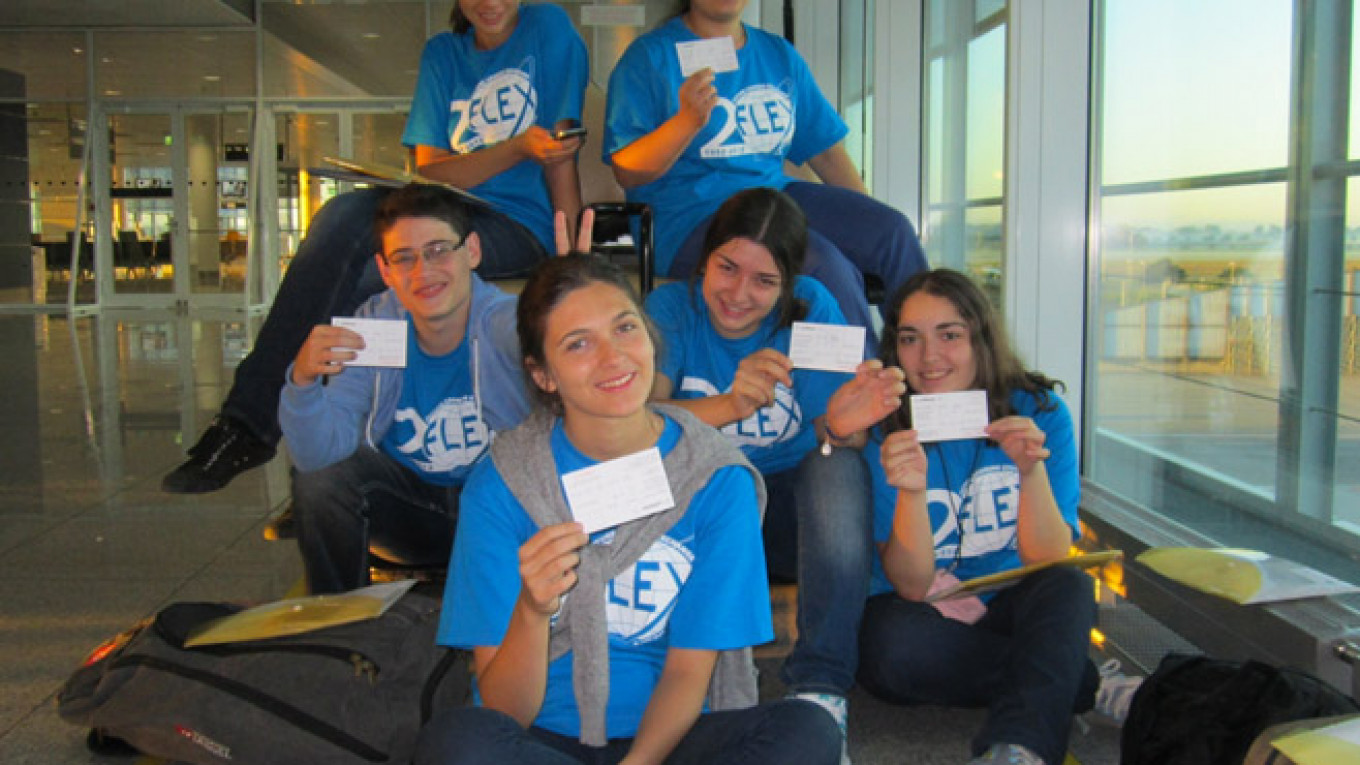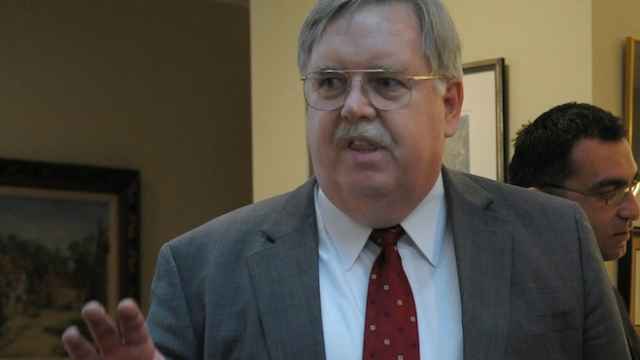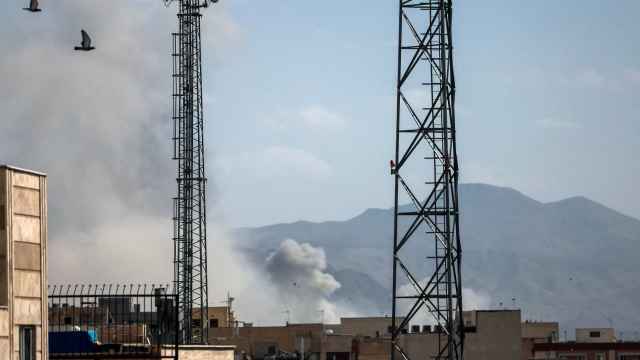David Petrosyan had hoped his 15-year-old sister would spend a year studying at a U.S. high school, something he had done years earlier that had a lasting impact on his ambitious academic pursuits.
"For me, doing a FLEX program proved that I can achieve something with my brain alone. It was very cool to feel like I could achieve something by myself at the young age of 16," Petrosyan, a 21-year-old university student at Moscow's prestigious Higher School of Economics, told The Moscow Times.
But David's hopes for his sister fizzled Tuesday, when news broke that the Russian government had decided to pull out of the exchange program due to an alleged same-sex adoption of a Russian teen.
End of an Era
FLEX — short for "Future Leaders Exchange" — was established in the direct aftermath of the Cold War with the aim of creating educational opportunities on U.S. soil for promising young students from 12 former Soviet republics.
Since 1992, the program has brought more than 8,000 Russian teenagers halfway around the globe to live with American families and attend local high schools across all 50 states.
FLEX's stated goal was to teach students about democracy "firsthand through experiencing it," according to the program's sponsor, former U.S. Senator William Bradley.
Russia's Reason
Russia's child rights ombudsman Pavel Astakhov initially said the U.S. had violated the terms of the program by allowing one of its young participants to stay in the country permanently following the end of the academic year.
"Guardianship was established over a Russian student who was sent to the U.S. as part of the FLEX program. As a consequence — contrary to the agreements and rules of the program — a Russian teenager has stayed in another country," Astakhov said in a statement released Wednesday.
"There is nothing wrong with international exchange programs … until they violate the rules," he said.
He then told Russian state news agency TASS that the student had been taken in by a homosexual couple in the U.S.
Astakhov did not identify the student by name, and was unavailable when contacted by The Moscow Times for a comment on Wednesday.
The Plot Thickens
The Russian Foreign Ministry's human rights commissioner, Konstantin Dolgov, echoed Astakhov's claims on Wednesday, adding that the mysterious breach of the program's terms "created conditions for circumventing Russian law — including a ban on the adoption of Russian children by U.S. citizens, including those of non-traditional sexual orientation."
After mentioning the hypothetical scenario of a non-traditional American couple adopting a Russian child, Dolgov said: "Such an incident, unfortunately, took place."
A high-level employee with the American Councils for International Education, which administrates the FLEX program, corroborated Dolgov's hint.
ACIE executive vice president David Patton told BuzzFeed on Wednesday that such an incident took place, saying that the student had not been placed with a same-sex couple, but that he did become friends with one during the program.
"There is certainly a grain of truth about everything that is said here," Patton told BuzzFeed, referring to Russian officials' allegations.
Patton also confirmed that FLEX participants can be placed with non-traditional families.
He did not return a request for comment from The Moscow Times.
Political Maneuvering?
According to Kirill Koktysh, a political analyst and associate professor at Moscow's State Institute of International Relations (MGIMO), the real reason for FLEX's closure is political.
"This program definitely had a political component to it. Every country wants to project its value system as the best one worldwide. The U.S. is doing it more aggressively than some other countries," Koktysh told The Moscow Times.
Nigora Kutbiddinova, 21, who spent her FLEX year in Falcon, Colorado, said she did not see any political component to the program.
"The program is essentially a cultural exchange. The student isn't only there to learn about the U.S., but also to represent Russia," said Kutbiddinova, a law student in her final year at the Plekhanov Russian University of Economics in Moscow.
Safeguards Against U.S. Immigration
Several FLEX alumni told The Moscow Times that participants in the program are prohibited from staying in the U.S. or from applying for residence visas within two years after returning home.
"For two years you can only come to the U.S. as a tourist, so the program does not provide options for immigration," said Petrosyan, who spent his FLEX year in Louisville, Kentucky.
Eduard Khakimov, the administrator of an unofficial FLEX web community that publishes blogs of the program's participants, said the selection process weeds out anyone deemed a risk of staying in the U.S. long term following completion of the academic year.
"[Astakhov's explanation] is absurd because one of the key rules is that the candidate cannot have any pre-existing connections in the U.S.," he said on the phone from his native Naberezhniye Chelny.
Once back in Russia, FLEX alumni tend to remain a closely knit community that participates in a variety of volunteer projects.
Other Opportunities
At present, there are hundreds of other exchange programs available to Russian high school and university students. According to Koktysh, FLEX's closure has had no impact on exchange programs at MGIMO.
"I don't think that a decision to cancel many more programs will be made. This is not the forefront of confrontation, and the impact of such exchanges on society is negligible," he said.
Late last year President Vladimir Putin passed a decree establishing a "global education" program that would grant funds to bright young Russians to study at universities among the 225 highest-ranked around the globe, including in the U.S.
But the program has not yet been launched, as the Education Ministry is still working on logistic issues.
Contact the author at [email protected]
A Message from The Moscow Times:
Dear readers,
We are facing unprecedented challenges. Russia's Prosecutor General's Office has designated The Moscow Times as an "undesirable" organization, criminalizing our work and putting our staff at risk of prosecution. This follows our earlier unjust labeling as a "foreign agent."
These actions are direct attempts to silence independent journalism in Russia. The authorities claim our work "discredits the decisions of the Russian leadership." We see things differently: we strive to provide accurate, unbiased reporting on Russia.
We, the journalists of The Moscow Times, refuse to be silenced. But to continue our work, we need your help.
Your support, no matter how small, makes a world of difference. If you can, please support us monthly starting from just $2. It's quick to set up, and every contribution makes a significant impact.
By supporting The Moscow Times, you're defending open, independent journalism in the face of repression. Thank you for standing with us.
Remind me later.






